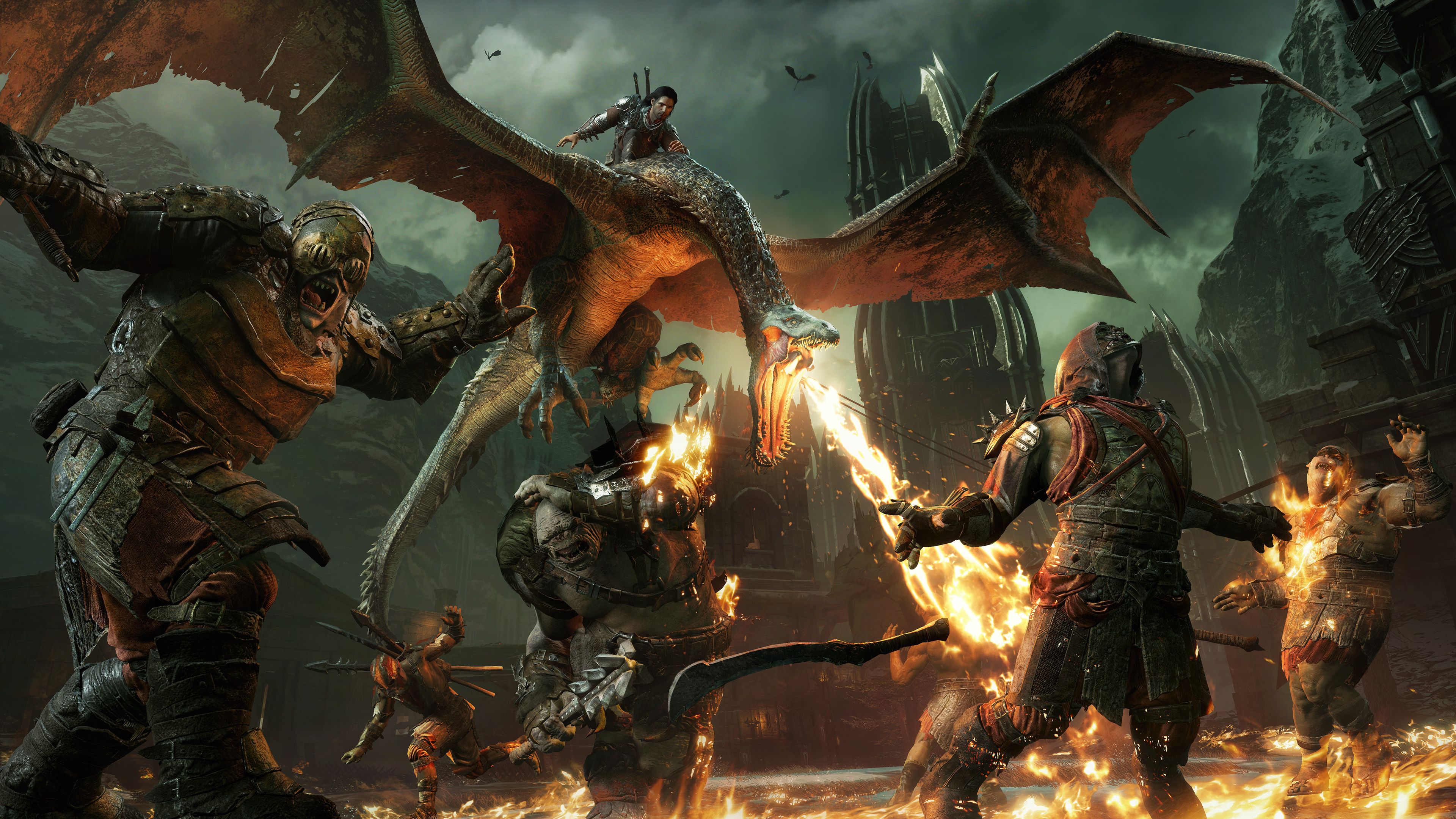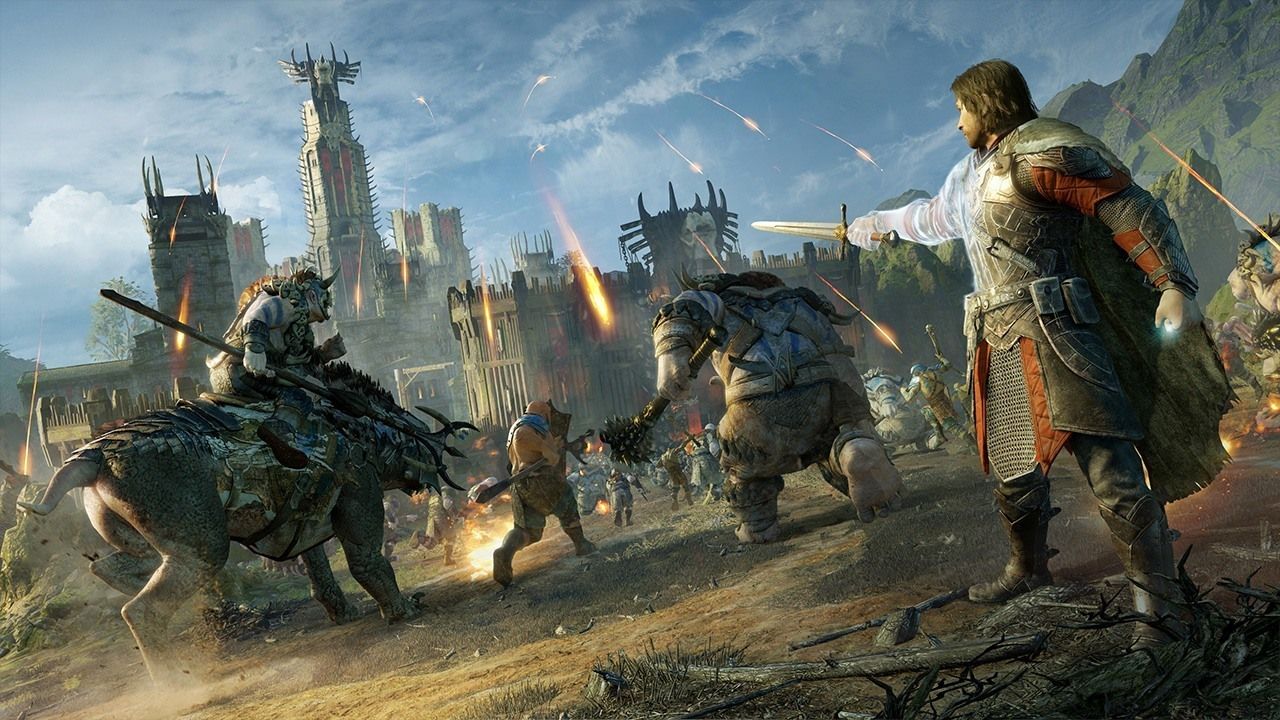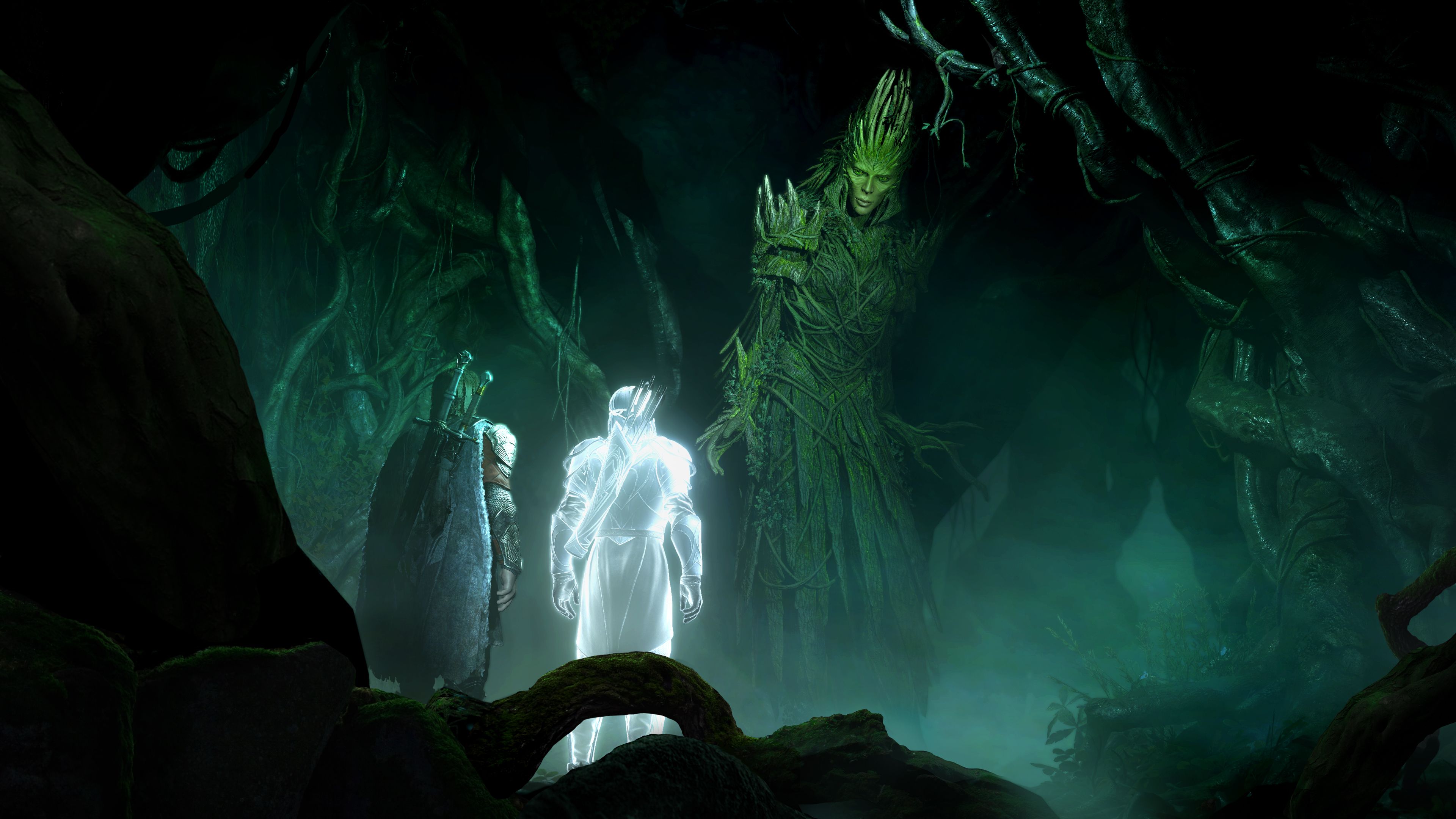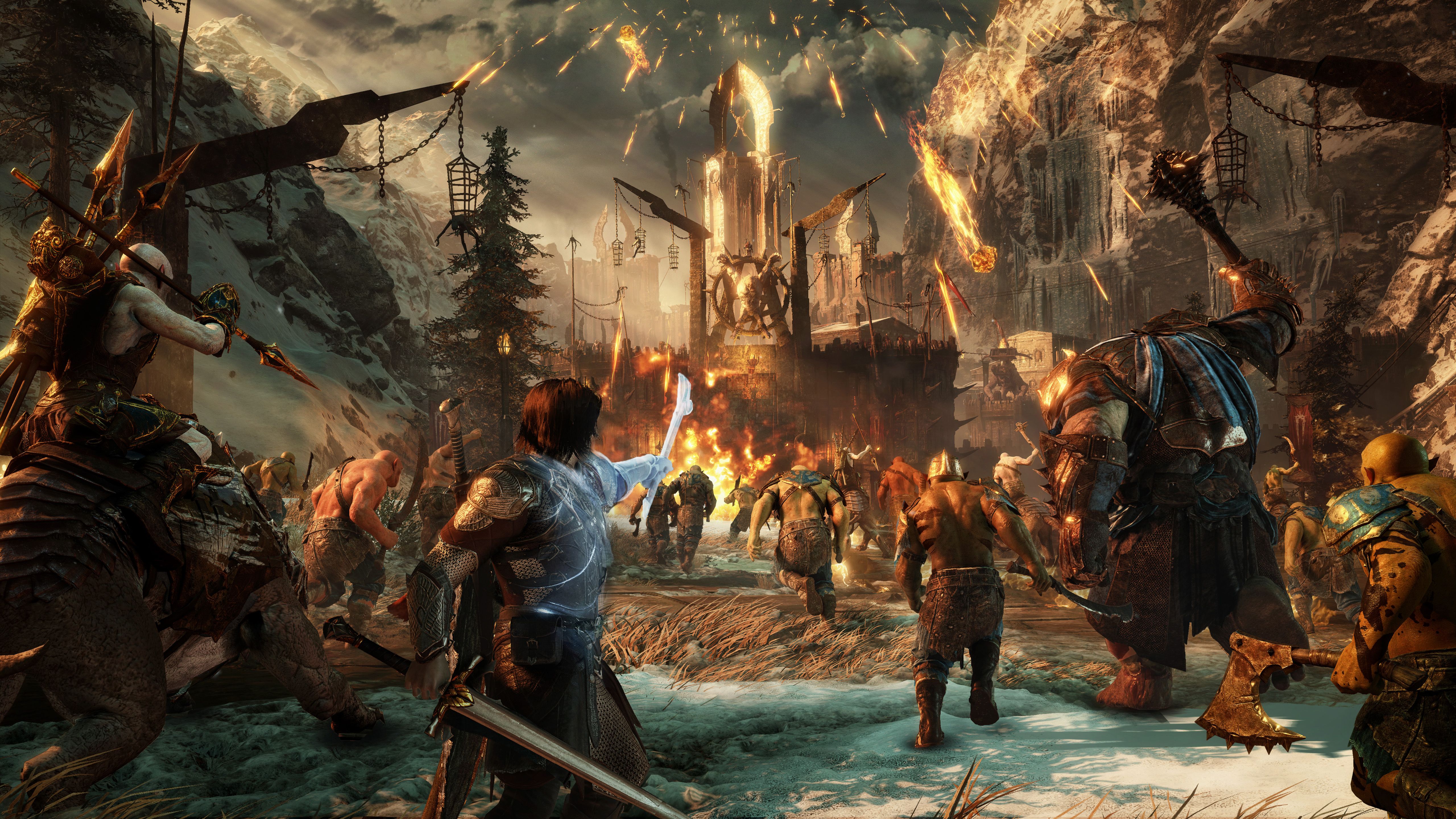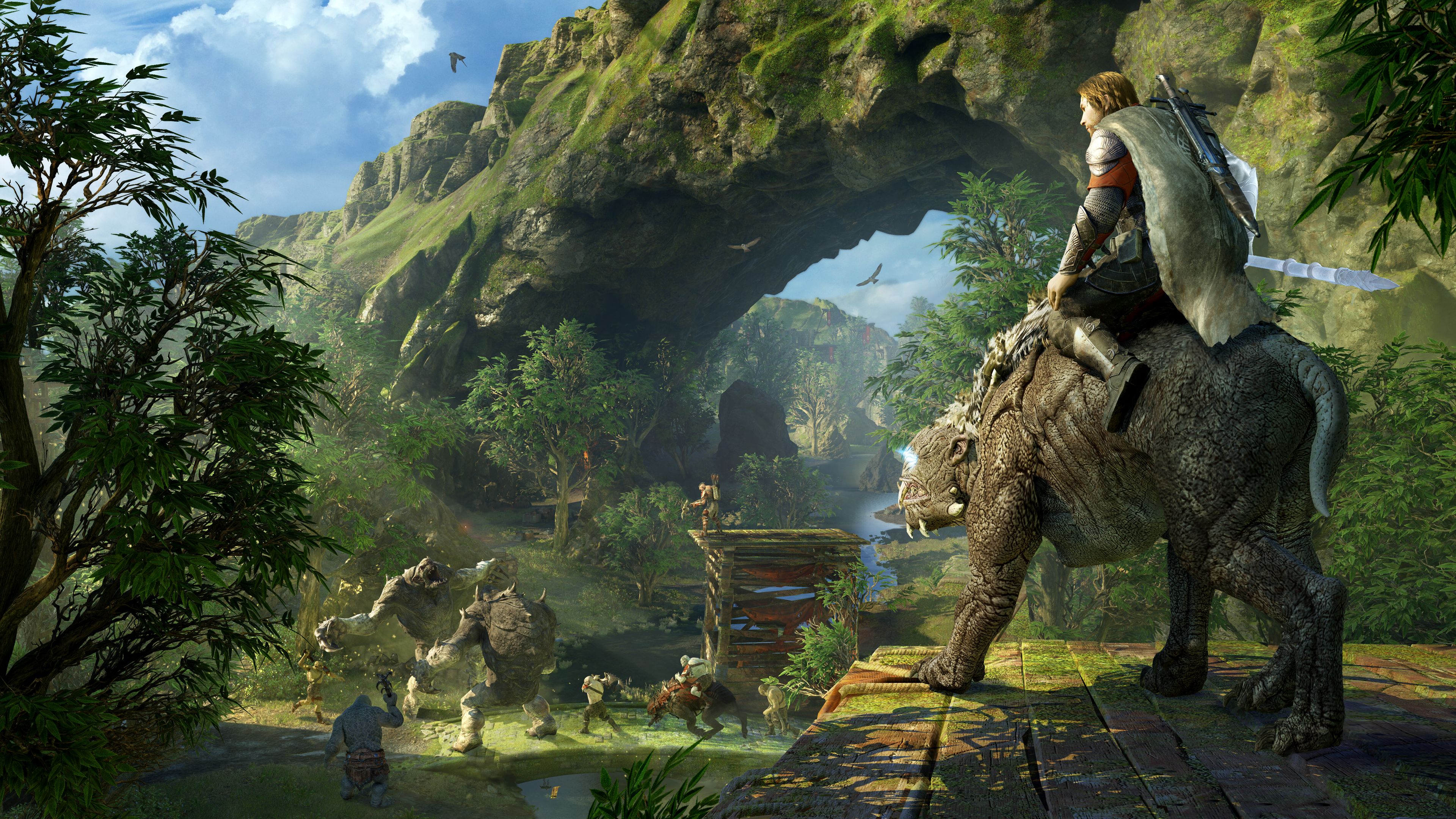Of the year's remaining games, next month's release of Middle-earth: Shadow of War is one of the most anticipated. The sequel to 2014's Shadow of Mordor takes elements from the first game and cranks them up to eleven with larger, more chaotic battles, a variety of new enemies, and a deeper layout of the much loved Nemesis system. Of course, to match such large changes, Shadow of War needed an even larger soundtrack to make the game that much more epic.
Recently, we were able to sit down with Garry Schyman, one of the composers of the upcoming action RPG Middle-earth: Shadow of War to talk about what it's like to work on a Lord of the Rings project and the differences between creating music for games compared to that of TV and film.
Logan: For those who maybe don't know Garry, you served as the composer on 2014's Shadow of Mordor and now you are obviously working on the game's sequel, Shadow of War. While this isn't the first time in your career that you have worked on a sequel -- Bioshock, Destroy All Humans -- I'm wondering how you tend to approach a follow-up game rather than an entirely new project. Are there certain things that you wanted to take with you from Shadow of Mordor as you began working on Shadow of War?
Garry Schyman: Well, let me first be clear that Nathan Grigg is the in-house music composer and Senior Music Supervisor at Monolith and we both composed enormous amounts of music for both games. I wrote over two-and-a-half hours of music for Shadow of War and he wrote a couple hours of music as well so it was definitely a team effort.
Together, we just took what was best about Shadow of Mordor and we extended it into Shadow of War. In the same way that John Williams doesn't reinvent the style of music for Star Wars every time he does a new film, he just writes music that's appropriate for that film that he's scoring at that time. There are unique characters in Shadow of War and the world is much vaster this time around. You'll probably need to take a vacation to see the whole game. (laughs)
But yeah, the game is quite magnificent and I think our music rises to the occasion. We were given the resources to record with a large orchestra in Seattle. We spent over two weeks with the orchestra and choir recording and I think it sounds pretty good. While we didn't necessarily try to reinvent the wheel on Shadow of War, I definitely think it's unique to the first while still containing many similar characters as well as a handful of new characters and different Orc tribes.
In LA I recorded with some primitive instruments so I brought in two wind players and they brought in all kinds of really cool stuff. From different types of conch shells, to horns from different animals, a twelve-foot horn from Nepal, and all kinds of other cool things. We created a kind of library with this unique, primitive sounding calls and then added them where appropriate.
L: Shadow of War definitely has these tribal overtones to it due to the nature of these different Orc factions that are spread throughout the game. In fact, those varying tribes have been one of the big things that I think Warner Bros. and Monolith Productions have been showing off lately in some of the recent trailers for the game. For you, what was it like coming up with a different style or feel for each of these tribes within Shadow of War?
GS: Every tribe has characteristics about them and so I tried to find how those characteristics could be translated into a musical idea. There is a tribe that had this sort of royal quality to them so I went and looked at things like the kings of ancient Europe and I had these old instruments that I added to that. Although, these weren't stately sounds that I was adding because these Orcs are still a wild group.
You use those instruments, let's say a harpsichord, and you use it in a way that the harpsichord typically wouldn't be used. Stuff like this in addition to horn and trumpet calls are done in a really wild way so that it suggests that period of time that these instruments are from but then creates something new and unique for that tribe.
L: That sounds awesome. One of my most anticipated things about the game is coming across all of the different tribes and I can't wait to hear what you've done with the music for each group. What is it like to work on such a famous IP with a game set in the universe of The Lord of the Rings? Were you a fan of the franchise before starting on both of these projects?
GS: I mean, it's a famous IP and it's one that has been around for many, many decades but I wouldn't call myself a fan. I certainly wasn't a fan of the films because I have only seen one of them. However, I think that actually worked to my advantage because it made sure I wasn't trying to just copy Howard Shore's score from the films -- which he won an Academy Award for.
But yeah, I just wasn't familiar with them so I couldn't copy something I wasn't aware of. I'm not anti-Lord of the Rings by any means, but I just couldn't call myself a Tolkien nerd, because I'm not.
L: I'm right there with you, which is kind of ironic. I adore these games but I'm not not a huge fan of The Lord of the Rings movies and I've never read the books.
GS: You know what's interesting is that there were a number of Lord of the Rings games prior to Shadow of Mordor and Shadow of War but they were all based on the films. The way they were structured and the storyline was typically based upon a specific film.
None of them really achieved enormous success however until Shadow of Mordor which just creates a story based in this world that Tolkien created. Because Monolith was so creative and spent so much time thinking about how the story could unfold in Shadow of Mordor, I think it really helped to make the game super unique.
L: To touch on this again before we move on, because you're not a huge LOTR fan, and as you said, you weren't aware of the music from the films, did you ever go back and listen to the scores from the films after initially finishing your work on Shadow of Mordor? Or have you made sure to never listen to that music as to help you with your own writing for the game?
GS: I have never gone back to listen to to any of it, and the studio was very supportive of that. They said that they didn't want me to try and imitate that music. For instance, a lot of the Star Wars games are totally based around trying to have the music sound like John Williams. We were not asked to do anything like that with either Shadow of Mordor or Shadow of War. I'm very grateful that we weren't expected to do that.
What's funny is that some people have told me, "That Gollum cue sounds a little like the one in the movies," and I would just say, "Well, if it does then it's because we both thought about Gollum in the same musical way." I still haven't listened to what Howard Shore's Gollum theme is.
[pullquote] "I certainly wasn't a fan of the films because I have only seen one of them. However, I think that actually worked to my advantage because it made sure I wasn't trying to just copy Howard Shore's score from the films..." [/pullquote]
L: I'll be honest, that's not the answer I was expecting. I just assumed you would be an existing fan of the LOTR franchise so for you to tell me otherwise is way more interesting to me.
I was looking up a bit of your past discography before we began talking today and from what I saw, you've done a bunch of different music for television, movies, and of course, video games. What stood out to me though is that you haven't done as much of the TV and film work since you began composing for games. Is that something you have done purposefully? Do you prefer writing for games compared to that of TV and film?
GS: Well, I think there are several things: First off, I have been very fortunate and have been getting lots of game gigs. I think people get pigeonholed to a certain extent and they only begin to see you as doing one thing. The people that hire you to write music for games are completely unique from the people that hire you to write music for film and the others with television. It's almost three distinct groups, although with film and TV there is probably more overlap than in games. Video games are completely separate and distinct.
I'm not avoiding doing film and TV but I have just had way more opportunities with games, and cooler ones as well. There have been some films that I have been offered but they were just so terrible that I said no. (laughs) I just didn't want to do that. I've got enough work.
I don't consider myself a game composer though, I just consider myself a composer for audio visual media. I teach at USC and I have students who are all film, TV, and game composers. Five to six years ago when I started, students were less interested in composing for games but now they come in and tell me, "I just want to score games." That's their only focus. I tell them, "That's a mistake. You want to score anything that people will pay you to score." I just happen to have been lucky with games, personally.
I will say this though about working in games: the nicest people you will ever meet or work for in the industry are game developers. There's no huge egos like you might find in some of the other mediums. You're just dealing with lovely, great people and that is what's cool. It makes things way less stressful.
L: Since you do have experience in all of these different mediums, I'm curious, are scores for video games more daunting? Rather than a 90 minute or two hour movie, the games you have worked on are anywhere from ten to twenty hours long. Does that make the project more difficult or does the lengthened period in which games are developed helps offset that?
GS: Yeah, because games are more stretched out I think that makes them much less stressful. You don't have the same intense deadlines. TV is the worst in terms of deadlines. Very often, you'll have a few days to write quite a bit of music. Film usually lasts from anywhere between a month or three months. When I first started with games though, I had maybe two months to score most of the game. Now it seems like I'm on a game for a year or something like that.
The other game I'm working on now I think I've been on for about four months and I'm about to finish. You may write more music with games, like with the two-and-a-half hours I wrote for Shadow of War, but almost no films have that much music in them. Because games are stretched out over the course of a year though, it was no challenge at all to write that much music. Coming from TV and film writing 60 minutes of music within a month isn't hard for me-- it's just normal.
L: So I have been a fan of your work in video games for quite some time and I think what's always stood out to me is how well your music matches the tone of the world that the game is set in. While there are a lot of composers whose work I admire in the industry, I really do think you are one of the best when it comes to nailing the tone. How are you so good at that? Is it just something natural for you or does it take a ton of work and practice?
GS: Thank you, I appreciate that very much. Literally, I think that's what a film, TV, or game composer is supposed to do. We're not hired to just do whatever we want. I often make the joke that I can write any music I want as long as the developer likes it. (laughs)
I think I just make a strong effort to listen very closely and carefully to what the development team has to say. They don't know music -- even though some of them do have musical backgrounds -- but what they do have is this immersion in the game they've been making. When they hear music, it might be a great piece of music, but they'll know whether or not it's fitting the game. You just really want to listen to them and to reflect on what they're saying. You will write music that they won't like but you have to respect that. It's a process and it takes time.
Of course, I think experience and doing this for many, many years helps you learn and get better just like anything in life. Hopefully you continue to improve your whole career. I do appreciate your kind words and I just do my best. I'm sure every composer is doing the same when they're scoring a project.
[pullquote] "Because games are stretched out over the course of a year though, it was no challenge at all to write that much music. Coming from TV and film writing 60 minutes of music within a month isn't hard for me-- it's just normal." [/pullquote]
L: While you said that sometimes you'll show developers a piece of music that they won't like, how often do you nail a new track on the first try? I've talked to some other composers and they made it sound more common than I expected.
GS: If you're talking about coming up with the original concept, I would say a decent percentage of the time I have it on the first try. On other games though, like Bioshock, it took awhile to play around with ideas and go back and forth. Bioshock was tough just because it is so unique. The audio director Emily Ridgeway said that one of her original concepts for the game was that it shouldn't sound like any other film, TV, or game score. So yeah, it takes awhile to come up with something like that -- a lot of experimentation. Once I came up with it though, the writing came very quickly but it took about a month or six weeks. For Dante's Inferno, the original theme I came up with was not a good one, but the second one was it.
L: Can you just tell when you've got it? Before you ever even show it to the development team, do you just know when you found exactly what you were looking for?
GS: Yeah, you can. There's a little voice inside of you that says, "Damn, that's it." Sometimes you think you're in the right area and you're not, but you kind of know that maybe it will or won't work. When you really have it though, you know.
With the original Bioshock, I was playing around with some ideas in my studio and I came up with this idea with these dark, dissonant backgrounds and then having some solo violin or cello over it. I thought that was really cool and I immediately sent it to Emily and she said, "That's it. That's the Bioshock sound." So yeah, sometimes you just really know.
L: My last question for you deals with the video game composition scene as a whole. I don't know how much you pay attention to other composers and their within the gaming industry, but to me this has been a landmark year for music in games. There has been a new standout soundtrack in nearly every month of 2017, which I can't remember happening in the past. Do you pay attention at all to other people's work within the games industry and are you all just trying to one-up each other in 2017? (laughs)
GS: I can't say that I'm aware of all of them. Some of them come to my attention and I'll take a listen but I don't think of it as a competition necessarily. I think there's a lot of cool games coming out and I think there's a lot of great composers out there. I'm interested though, if you have a list of great soundtracks from this year, would you send me a list of maybe four or five? I'd love to hear what you think is stand out stuff.
L: Of course! I would love to hear what you think.
I later emailed Garry links to the Persona 5, Destiny 2, Mario + Rabbids Kingdom Battle, RiME, and NieR: Automata soundtracks. He told me that he couldn't wait to listen to them.
Garry's work on Middle-earth: Shadow of War can be heard when the game releases next month on October 10 for PS4, Xbox One, and PC.

